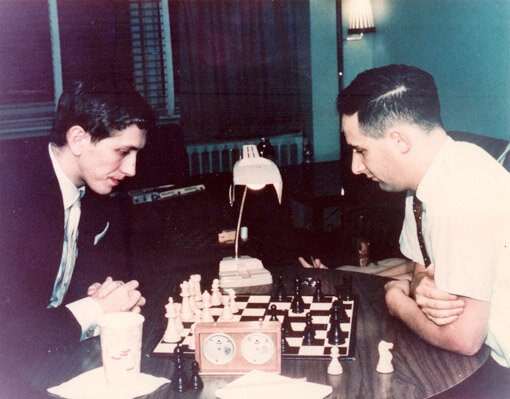Blog.
Hearst vs. Bobby Fischer
AUGUST 6, 2007
Last month I went to Tucson, Arizona, to help my father, Eliot Hearst, celebrate his 75th birthday. After retiring from his job as a distinguished professor of psychology at Indiana University, he moved to New York for three years and then re-retired to Arizona in 1998. He was born in Manhattan and grew up in Chelsea, long before the neighborhood’s gentrification.
During my Tucson visit, I spent an afternoon making scans of some highlights from his photo collection, and I was finally able to digitize the most treasured image from the Hearst family archive: a photograph of my father playing a casual game of chess with Bobby Fischer in August 1962. This is no novelty shot; my father was one of the top players in the United States in the 1950s and early 1960s, eventually earning the title of Life Senior Master. Both he and Fischer spent time at the Marshall Chess Club, which is still located on West 10th Street between 5th and 6th Avenues, as it was back then.
My dad’s on the right:
At the time the photo was taken, my father was about to serve as the captain of the 1962 U.S. Olympic chess team; Bobby was the squad’s star player. It would be ten more years before Bobby’s cold-war proxy battle with Boris Spassky in Rejkjavik made him the most famous chess player in the world.
My father was a columnist for Chess Life for several years in the 1960s. After the 1962 Olympiad, which took place in Varna, Bulgaria, he wrote a column about the tournament, and his column was accompanied by this illustration of the team. My dad’s in the center, Bobby’s at upper right:
Here’s a list of all the chess luminaries in the illo, from left to right: Larry Evans, Pal Benko, Edmar Mednis, Eliot Hearst, Robert Byrne (the chess columnist for The New York Times from 1972 to 2006), Bobby Fischer, Donald Byrne.
My father beat Fischer in a tournament game in 1956, a mere three rounds after young Fischer defeated Donald Byrne in what became known as The Game of the Century. At chessgames.com, you can play through the game where my father defeated Fischer.
For many years my father and a co-author have been writing a huge book about the history and psychology of blindfold chess. At this point he’s clearly one of the world’s top experts on the subject. He recently completed work on all but the smallest details, and the book is scheduled to be published sometime next year. I’ll definitely be posting more info when the time comes.

